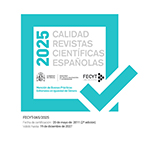“Despotic Landowners”: Historiography, Denunciations, and Sources regarding Corruption in Portuguese America
Abstract
This article, which is divided into four parts, defends the hypothesis that in the political culture of the Ancien Regime, a distinction existed between what was deemed to be and experienced as licit and illicit. Hence, the concept of corruption can be applied to the societies of the Modern Age, albeit considering the appropriate limits and nuances of the time, as well as the specific conceptions associated with the different historical conjunctures. The first two parts propose a discussion of the theme of corruption within the social space, which is based on recent historiography as well as on the works of authors that lived and wrote in the 17th and 18th centuries. Aferward, an analysis is offered of the representation made by the inhabitants of Rio de Janeiro before Queen Maria I in 1779, by which the officers of the Cabildo were accused of intrusion, despotism and usurpation of the inhabitants’ rights to the possession of urban lands that had been guaranteed since the city was founded. Finally, there is a discussion of the individual and collective means and strategies utilized to denounce corruption in the intercontinental Portuguese monarchy, keeping in mind the centrality of the king and the efficacy of royal justice.Downloads
Article download
License
In order to support the global exchange of knowledge, the journal Revista Complutense de Historia de América is allowing unrestricted access to its content as from its publication in this electronic edition, and as such it is an open-access journal. The originals published in this journal are the property of the Complutense University of Madrid and any reproduction thereof in full or in part must cite the source. All content is distributed under a Creative Commons Attribution 4.0 use and distribution licence (CC BY 4.0). This circumstance must be expressly stated in these terms where necessary. You can view the summary and the complete legal text of the licence.











